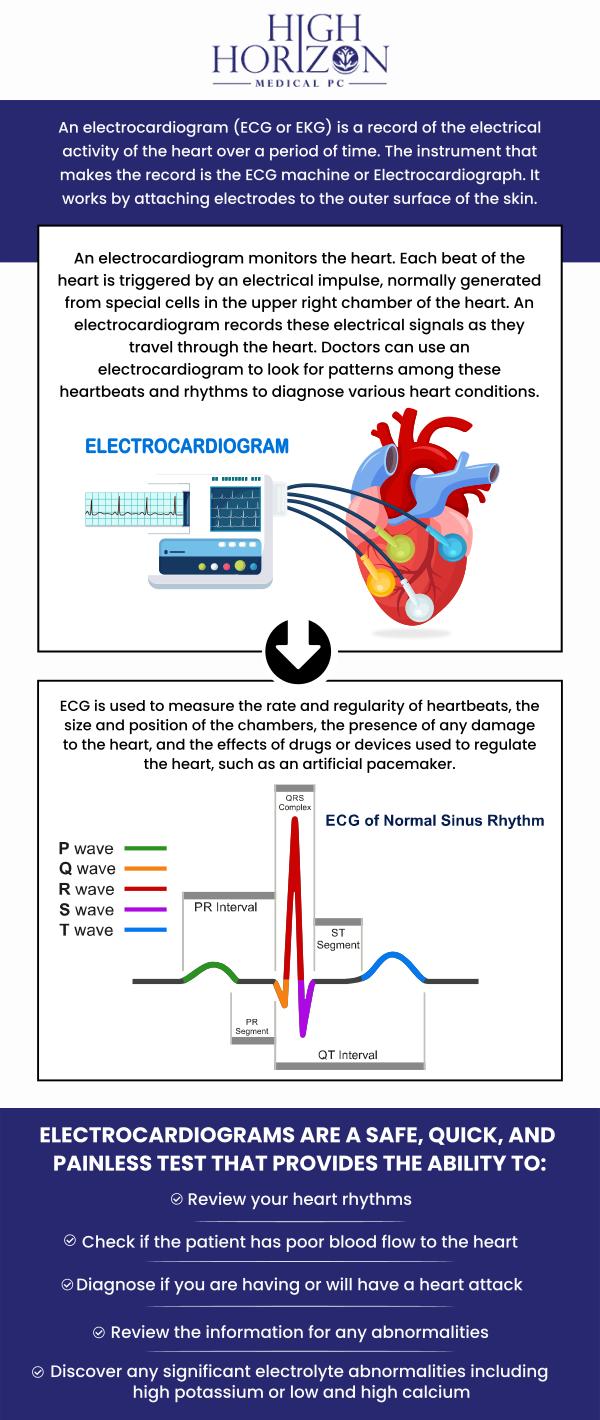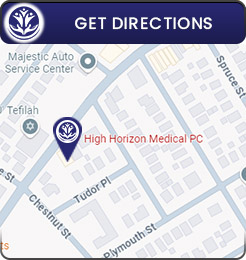How Often Should You Get an EKG Done?
If you’re wondering how often you should get an Electrocardiogram (EKG), the frequency depends on your health status and risk factors. Dr. Ali Tabbaroki, MD, and the team at High Horizon Medical PC are committed to evaluating your individual health needs. Based on your risk factors, they can recommend the appropriate EKG schedule to ensure your heart stays in optimal condition. For more information contact us or schedule an appointment. We are conveniently located at 396 Hempstead Ave, West Hempstead, NY 11552.


Table of Contents:
How often do you repeat EKG?
Is an annual EKG necessary?
Can anxiety cause abnormal EKG?
What symptoms require an EKG?
At High Horizon Medical PC, we place great importance on comprehensive heart health checks, especially EKG monitoring, to ensure optimal cardiovascular health for our patients. Utilizing EKG, or electrocardiogram, we can accurately measure the electrical activity of your heartbeat and diagnose any underlying heart conditions, including heart attacks and arrhythmias. Our decision to administer repeat EKGs is influenced by several factors that help us monitor and manage your heart health effectively. If irregularities such as ST-segment elevation or depression, arrhythmias, or conduction defects are found in your initial EKG, we conduct repeat EKGs more frequently to closely monitor any changes that may indicate a worsening condition.
We also utilize EKG monitoring to guide treatment decisions and track your response to medications or other interventions. By repeating EKGs, we can assess the effectiveness of your treatment and detect any adverse effects. If you possess risk factors such as age, smoking status, obesity, or a family history of heart disease, we might recommend more frequent EKG monitoring. Even for asymptomatic individuals with no known heart conditions, periodic EKG screening may be suggested to detect any underlying abnormalities that may increase the risk of future cardiac events.
Our patients hospitalized for heart-related issues may undergo an EKG daily or even multiple times a day. We encourage open discussions regarding your heart health, and we promise to provide personalized advice based on your health history and current condition. The frequency of repeat EKG monitoring is carefully tailored based on each patient’s clinical presentation, risk factors, and our professional assessment of the potential benefits and risks.
Electrocardiogram (EKG) is a simple, non-invasive test that measures your heart’s electrical activity. This examination is done to find cardiac symptoms, disease, abnormal heart rhythms, and other heart-related problems.
One of the services we offer is an electrocardiogram (EKG), a simple, non-invasive test that measures your heart’s electrical activity. The necessity of an annual EKG can depend on various factors, including age, health status, and risk factors for heart disease. For healthy individuals with no symptoms or risk factors for heart disease, an annual EKG may not be necessary. However, for individuals at high risk for heart disease, or those with symptoms such as chest pain, shortness of breath, or irregular heartbeats, an annual EKG may be beneficial.
We are dedicated to early detection and management of heart problems. If you have a known heart condition, such as atrial fibrillation or heart failure, an annual EKG can help us monitor your condition and adjust your treatment plan if necessary. We also recommend annual EKGs to certain individuals at risk, such as those with diabetes, high blood pressure, or a family history of heart disease.
The decision of whether or not to get an annual EKG should be made in consultation with our medical professionals. Factors to consider include your age, risk factors for heart disease, and any symptoms you may be experiencing. We will take into account your personal health history and risk factors for heart disease to make the best recommendation for you.
At High Horizon Medical PC, we understand the complex relationship between mental health and physical health. Our team of highly skilled healthcare professionals, led by Dr. Ali Tabbaroki, MD, is dedicated to providing comprehensive care and is equipped to address both your physical and mental health concerns, including anxiety and its potential impact on your heart’s health. Anxiety is a prevalent condition, and it can have physical manifestations that can interfere with diagnostic tests such as an EKG. However, when a patient is experiencing anxiety, this can lead to an abnormal EKG. Anxiety causes the release of stress hormones like adrenaline and cortisol, which can affect the cardiovascular system. This could result in higher blood pressure, an increased heart rate, and changes in your heart’s electrical activity, hence affecting the EKG results.
We take this into account during our assessments. We understand that anxiety can create physical symptoms mimicking heart disease, such as chest pain, palpitations, and shortness of breath. These symptoms, coupled with an abnormal EKG, can lead to misinterpretation if the individual’s anxiety is not considered.
When you consult with our medical professionals and exhibit persistent or concerning anxiety symptoms, we may order an EKG to rule out any underlying heart conditions. If the EKG abnormalities are suspected to be caused by anxiety, we can recommend treatments such as lifestyle modifications, cognitive-behavioral therapy (CBT), or medications.
At High Horizon Medical PC, we prioritize your heart health. We use state-of-the-art diagnostic tools, including the Electrocardiogram (EKG), to monitor your heart’s electrical activity and detect any potential heart conditions. Symptoms that require immediate medical attention and an urgent EKG include a sudden onset of chest pain, discomfort, or tightness, especially if it’s accompanied by shortness of breath, dizziness, or fainting. These symptoms could indicate a heart attack or other heart condition.
Symptoms that warrant evaluation and consideration include persistent chest pain or discomfort, unexplained shortness of breath (particularly during exertion), or lightheadedness, especially if they occur together or with other symptoms. These may indicate a heart problem like heart failure or valve issues. Frequent dizziness, rapid or irregular heartbeat, unexplained fatigue, weakness, or difficulty exercising could also suggest heart problems. If you’ve had previous heart issues such as a heart attack, heart disease, or heart surgery, or have a family history of heart disease or sudden cardiac death, these conditions could affect the heart’s electrical activity.
At High Horizon Medical PC, we urge you to report any persistent or severe symptoms promptly. An EKG can provide valuable insights into the electrical activity of your heart, helping us diagnose and manage cardiac conditions effectively. If you have a history of heart problems or risk factors for heart disease, regular EKGs may also be necessary. Contact us today or schedule a consultation and ensure your heart is in optimal condition. We are conveniently located at 396 Hempstead Ave, West Hempstead, NY 11552. We serve patients from West Hempstead, NY, Valley Stream NY, Mineola NY, Lynbrook NY, Uniondale NY, New Hyde Park NY, Elmont NY, Rockville Centre NY, Queens NY, and surrounding areas.


Additional Services You May Need
▸ Primary Care
▸ Weight Loss
▸ Urgent Care
▸ HRT
▸ X-Ray
▸ Physical Exams
▸ Immunization Clinic
▸ Electrocardiogram (EKG)
▸ Rapid Lab Tests and Screening





